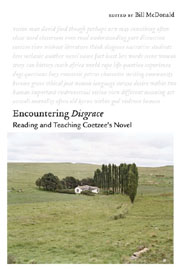Book contents
- Frontmatter
- Contents
- Acknowledgments
- Introduction
- I Reading Disgrace
- 1 “We are not asked to condemn”: Sympathy, Subjectivity, and the Narration of Disgrace
- 2 Beyond Sympathy: A Bakhtinian Reading of Disgrace
- 3 “Is it too late to educate the eye?”: David Lurie, Richard of St. Victor, and “vision as eros” in Disgrace
- 4 Disgrace and the Neighbor: An Interchange with Bill McDonald
- 5 To Live as Dogs or Pigs Live Under Us: Accepting What's on Offer in Disgrace
- 6 Tenuous Arrangements: The Ethics of Rape in Disgrace
- 7 Dis(g)race, or White Man Writing
- 8 Clerk in a Post-Religious Age: Reading Lurie's Remnant Romantic Temperament in Disgrace
- 9 Saying it Right in Disgrace: David Lurie, Faust, and the Romantic Conception of Language
- 10 The Dispossession of David Lurie
- II Reading Disgrace with Others
- Works Cited
- Notes on the Contributors
- Index
9 - Saying it Right in Disgrace: David Lurie, Faust, and the Romantic Conception of Language
from I - Reading Disgrace
Published online by Cambridge University Press: 12 September 2012
- Frontmatter
- Contents
- Acknowledgments
- Introduction
- I Reading Disgrace
- 1 “We are not asked to condemn”: Sympathy, Subjectivity, and the Narration of Disgrace
- 2 Beyond Sympathy: A Bakhtinian Reading of Disgrace
- 3 “Is it too late to educate the eye?”: David Lurie, Richard of St. Victor, and “vision as eros” in Disgrace
- 4 Disgrace and the Neighbor: An Interchange with Bill McDonald
- 5 To Live as Dogs or Pigs Live Under Us: Accepting What's on Offer in Disgrace
- 6 Tenuous Arrangements: The Ethics of Rape in Disgrace
- 7 Dis(g)race, or White Man Writing
- 8 Clerk in a Post-Religious Age: Reading Lurie's Remnant Romantic Temperament in Disgrace
- 9 Saying it Right in Disgrace: David Lurie, Faust, and the Romantic Conception of Language
- 10 The Dispossession of David Lurie
- II Reading Disgrace with Others
- Works Cited
- Notes on the Contributors
- Index
Summary
Two souls, alas! reside within my breast,
and each is eager for a separation:
in throes of coarse desire, one grips
the earth with all its senses;
the other struggles from the dust
to rise to high ancestral spheres
— Faust in Goethe, Faust I, 30, lines 1112–17Introduction
The titles of books David Lurie wrote when his scholarship still commanded “his heart” (162) are among the few things we know about his past life. And, just as McDonald shows us that the subject of The Vision of Richard of St. Victor has continued to influence Lurie's consciousness, so too has his critical study entitled Boito and the Faust Legend: The Genesis of Mefistofele. Its inclusion in the backdrop to Lurie's present likewise deserves more explication. The title offers intriguing ambiguities for interpretation: does the book focus on biography, literary history, or more narrowly on the stages of Mefistofele's composition? Are we to infer that Lurie emulates Boito, or perhaps the Mefistofele of the title, or even Faust?
There are some teasing, suggestive parallels between Arrigo Boito and David Lurie, and between the grandiose Mefistofele and Byron in Italy. Like Lurie, Boito was first and foremost a man of letters, steeped in European literature from adolescence, and better versed in it than in music. He wrote essays, comedies, poems, and journalism throughout his life. His first music teachers termed his work “mediocre.” Bernard Shaw called Mefistofele the product of “an accomplished literary man without original musical gifts, but ten times the taste and culture of a musician of only ordinary extraordinariness.”
- Type
- Chapter
- Information
- Encountering 'Disgrace'Reading and Teaching Coetzee's Novel, pp. 173 - 201Publisher: Boydell & BrewerPrint publication year: 2009

